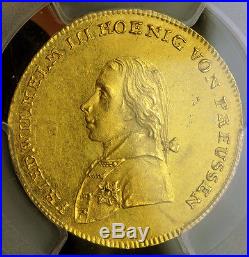prussia
1799, Prussia, Frederick William III. Gold Friedrick d’Or Coin. RR! PCGS AU-58



1799, Prussia, Frederick William III. Gold Friedrick d’Or Coin. Mint Year: 1799 Mint Place: Berlin (A) Reference: Friedberg 2422, Oldenburg 208, KM-371. Certified and graded by PCGS as AU-58! Denomination: Frederick d’Or (Friedrichs d’or = Gold Frederick) Material: Gold. 903 Weight: 6.7gm. Obverse: Uniformed bust of Frederick William III left. WILHELM III KOENIG VON PREUSSEN. Reverse: Crowned eagle of Prussia perched on war trophies (wreathed helmet, shield, sword & fasces). Date (17-99) split by mint initial (A) below. Legend: 17 (A) 99. Frederick William III German. (3 August 1770 7 June 1840) was king of Prussia from 1797 to 1840. He ruled Prussia during the difficult times of the Napoleonic Wars and the end of the Holy Roman Empire. Steering a careful course between France and her enemies, after a major military defeat in 1806, he eventually and reluctantly joined the coalition against Napoleon in the. Following Napoleon’s defeat he was King of Prussia during the Congress of Vienna which assembled to settle the political questions arising from the new, post-Napoleonic order in Europe. He was determined to unify the Protestant churches, to homogenize their liturgy, their organization and even their architecture. The long-term goal was to have fully centralized royal control of all the Protestant churches in the Prussian Union of churches. Frederick William was born in Potsdam in 1770 as the son of Frederick William II of Prussia and Frederika Louisa of Hesse-Darmstadt. He was considered to be a shy and reserved boy, which became noticeable in his particularly reticent conversations distinguished by the lack of personal pronouns. This manner of speech subsequently came to be considered entirely appropriate for military officers. As a child, Frederick William’s father (under the influence of his mistress, Wilhelmine Enke, Countess of Lichtenau) had him handed over to tutors, as was quite normal for the period. He spent part of the time living at Paretz, the estate of the old soldier Count Hans von Blumenthal who was the governor of his brother Prince Heinrich. They thus grew up partly with the Count’s son, who accompanied them on their Grand Tour in the 1780s. Frederick William was happy at Paretz, and for this reason in 1795 he bought it from his boyhood friend and turned it into an important royal country retreat. He was a melancholy boy, but he grew up pious and honest. His tutors included the dramatist Johann Engel. As a soldier he received the usual training of a Prussian prince, obtained his lieutenancy in 1784, became a colonel in 1790, and took part in the campaigns against France of 17921794. On 24 December 1793, Frederick William married Luise of Mecklenburg-Strelitz, who bore him ten children. (Crown Prince’s Palace) in Berlin, Frederick William lived a civil life with a problem-free marriage, which did not change even when he became King of Prussia in 1797. His wife Luise was particularly loved by the Prussian people, which boosted the popularity of the whole House of Hohenzollern, including the King himself. Frederick William succeeded to the throne on 16 November 1797. He also became, in personal union, the sovereign prince of the Principality of Neuchâtel (17971806 and again 18131840). At once, the new King showed that he was earnest of his good intentions by cutting down the expenses of the royal establishment, dismissing his father’s ministers, and reforming the most oppressive abuses of the late reign. He had the Hohenzollern determination to retain personal power but not the Hohenzollern genius for using it. Too distrustful to delegate responsibility to his ministers, he lacked the will to strike out and follow a consistent course for himself. Disgusted with the moral debauchery of his father’s court (in both political intrigues and sexual affairs), Frederick William’s first endeavor was to restore morality to his dynasty. The eagerness to restore dignity to his family went so far that it nearly caused sculptor Johann Gottfried Schadow to cancel his. Project, which was commissioned by the previous monarch Frederick William II. He was quoted as saying the following, which demonstrated his sense of duty and peculiar manner of speech. Every civil servant has a dual obligation: to the sovereign and to the country. It can occur that the two are not compatible; then, the duty to the country is higher. At first Frederick William and his advisors attempted to pursue a policy of neutrality in the Napoleonic Wars. Although they succeeded in keeping out of the Third Coalition in 1805, eventually Frederick William was swayed by the belligerent attitude of the queen, who led Prussia’s pro-war party, and entered into war in October 1806. On 14 October 1806, at the Battle of Jena-Auerstädt, the French defeated the Prussian army led by Frederick William, and the Prussian army collapsed. The royal family fled to Memel, East Prussia, where they fell on the mercy of Emperor Alexander I of Russia. Alexander, too, suffered defeat at the hands of the French, and at Tilsit on the Niemen France made peace with Russia and Prussia. Napoleon dealt with Prussia very harshly, despite the pregnant Queen’s personal interview with the French emperor. Prussia lost many of its Polish territories, as well as all territory west of the Elbe, and had to finance a large indemnity and to pay for French troops to occupy key strong points within the Kingdom. Although the ineffectual King himself seemed resigned to Prussia’s fate, various reforming ministers, such as Baron vom Stein, Prince von Hardenberg, Scharnhorst, and Count Gneisenau, set about reforming Prussia’s administration and military, with the encouragement of Queen Luise (who died, greatly mourned, in 1810). In 1813, following Napoleon’s defeat in Russia, Frederick William turned against France and signed an alliance with Russia at Kalisz, although he had to flee Berlin, still under French occupation. Prussian troops played a key part in the victories of the allies in 1813 and 1814, and the King himself travelled with the main army of Prince Schwarzenberg, along with Alexander of Russia and Francis of Austria. At the Congress of Vienna, Frederick William’s ministers succeeded in securing important territorial increases for Prussia, although they failed to obtain the annexation of all of Saxony, as they had wished. Following the war, Frederick William turned towards political reaction, abandoning the promises he had made in 1813 to provide Prussia with a constitution. Frederick William was determined to unify the Protestant churches, to homogenize their liturgy, their organization and even their architecture. In a series of proclamations over several years the. Church of the Prussian Union. Was formed, bringing together the majority group of Lutherans, and the minority group of Reformed Protestants. The main effect was that the government of Prussia had full control over church affairs, with the king himself recognized as the leading bishop. In 1824 Frederick William III remarried (morganatically) Countess Auguste von Harrach, Princess of Liegnitz. They had no children. He died on 7 June 1840 in Berlin, survived by his second wife. His eldest son, Frederick William IV, succeeded him. Frederick William III is buried at the Mausoleum in Schlosspark Charlottenburg, Berlin. The item “1799, Prussia, Frederick William III. Gold Friedrick d’Or Coin. RR! PCGS AU-58″ is in sale since Sunday, February 19, 2017. This item is in the category “Coins & Paper Money\Coins\ World\Gold”. The seller is “coinworldtv” and is located in Europe. This item can be shipped worldwide.
- Certification: PCGS
- Certification Number: 81492712
- Grade: AU58
